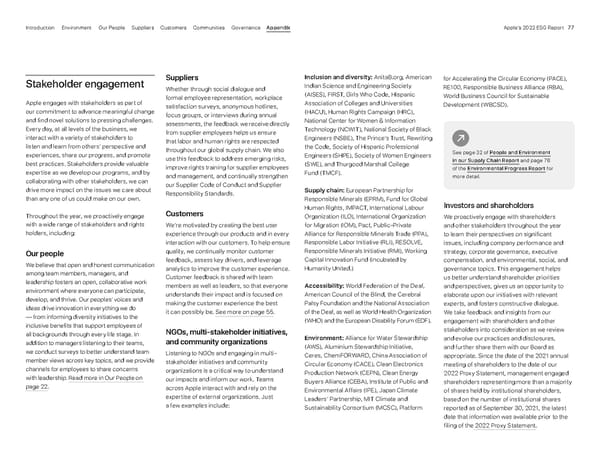Stakeholder engagement Apple engages with stakeholders as part of our commitment to advance meaningful change and find novel solutions to pressing challenges. Every day, at all levels of the business, we interact with a variety of stakeholders to listen and learn from others’ perspective and experiences, share our progress, and promote best practices. Stakeholders provide valuable expertise as we develop our programs, and by collaborating with other stakeholders, we can drive more impact on the issues we care about than any one of us could make on our own. Throughout the year, we proactively engage with a wide range of stakeholders and rights holders, including: Our people We believe that open and honest communication among team members, managers, and leadership fosters an open, collaborative work environment where everyone can participate, develop, and thrive. Our peoples’ voices and ideas drive innovation in everything we do — from informing diversity initiatives to the inclusive benefits that support employees of all backgrounds through every life stage. In addition to managers listening to their teams, we conduct surveys to better understand team member views across key topics, and we provide channels for employees to share concerns with leadership. Read more in Our People on page 22 . Suppliers Whether through social dialogue and formal employee representation, workplace satisfaction surveys, anonymous hotlines, focus groups, or interviews during annual assessments, the feedback we receive directly from supplier employees helps us ensure that labor and human rights are respected throughout our global supply chain. We also use this feedback to address emerging risks, improve rights training for supplier employees and management, and continually strengthen our Supplier Code of Conduct and Supplier Responsibility Standards. Customers We’re motivated by creating the best user experience through our products and in every interaction with our customers. To help ensure quality, we continually monitor customer feedback, assess key drivers, and leverage analytics to improve the customer experience. Customer feedback is shared with team members as well as leaders, so that everyone understands their impact and is focused on making the customer experience the best it can possibly be. See more on page 55 . NGOs, multi-stakeholder initiatives, and community organizations Listening to NGOs and engaging in multi- stakeholder initiatives and community organizations is a critical way to understand our impacts and inform our work. Teams across Apple interact with and rely on the expertise of external organizations. Just a few examples include: Inclusion and diversity: AnitaB.org, American Indian Science and Engineering Society (AISES), FIRST, Girls Who Code, Hispanic Association of Colleges and Universities (HACU), Human Rights Campaign (HRC), National Center for Women & Information Technology (NCWIT), National Society of Black Engineers (NSBE), The Prince’s Trust, Rewriting the Code, Society of Hispanic Professional Engineers (SHPE), Society of Women Engineers (SWE), and Thurgood Marshall College Fund (TMCF). Supply chain: European Partnership for Responsible Minerals (EPRM), Fund for Global Human Rights, IMPACT, International Labour Organization (ILO), International Organization for Migration (IOM), Pact, Public-Private Alliance for Responsible Minerals Trade (PPA), Responsible Labor Initiative (RLI), RESOLVE, Responsible Minerals Initiative (RMI), Working Capital Innovation Fund (incubated by Humanity United.) Accessibility: World Federation of the Deaf, American Council of the Blind, the Cerebral Palsy Foundation and the National Association of the Deaf, as well as World Health Organization (WHO) and the European Disability Forum (EDF). Environment: Alliance for Water Stewardship (AWS), Aluminium Stewardship Initiative, Ceres, ChemFORWARD, China Association of Circular Economy (CACE), Clean Electronics Production Network (CEPN), Clean Energy Buyers Alliance (CEBA), Institute of Public and Environmental Affairs (IPE), Japan Climate Leaders’ Partnership, MIT Climate and Sustainability Consortium (MCSC), Platform See page 32 of People and Environment in our Supply Chain Report and page 78 of the Environmental Progress Report for more detail. Investors and shareholders We proactively engage with shareholders and other stakeholders throughout the year to learn their perspectives on significant issues, including company performance and strategy, corporate governance, executive compensation, and environmental, social, and governance topics. This engagement helps us better understand shareholder priorities and perspectives, gives us an opportunity to elaborate upon our initiatives with relevant experts, and fosters constructive dialogue. We take feedback and insights from our engagement with shareholders and other stakeholders into consideration as we review and evolve our practices and disclosures, and further share them with our Board as appropriate. Since the date of the 2021 annual meeting of shareholders to the date of our 2022 Proxy Statement, management engaged shareholders representing more than a majority of shares held by institutional shareholders, based on the number of institutional shares reported as of September 30, 2021, the latest date that information was available prior to the filing of the 2022 Proxy Statement . for Accelerating the Circular Economy (PACE), RE100, Responsible Business Alliance (RBA), World Business Council for Sustainable Development (WBCSD). Appendix Governance Communities Suppliers Customers Our People Environment Introduction Apple’s 2022 ESG Report 77
 ESG Report | Apple Page 76 Page 78
ESG Report | Apple Page 76 Page 78